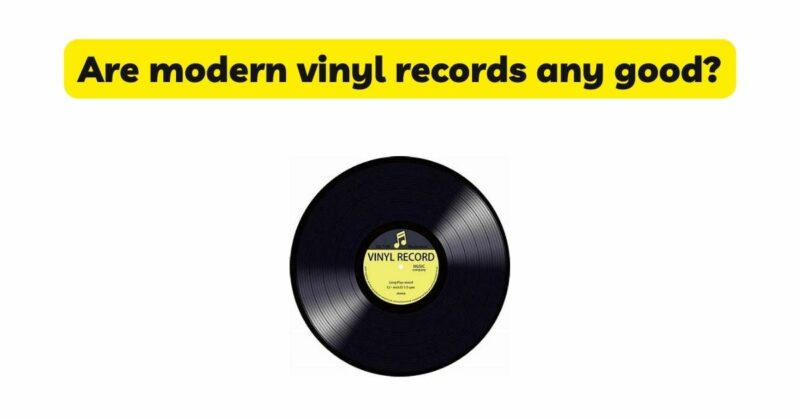The resurgence of vinyl records in recent years has sparked debates and discussions about their sound quality and overall worth in the modern era of digital music. Skeptics argue that vinyl is simply a nostalgic trend, while others passionately advocate for the unique and captivating experience that vinyl provides. In this article, we will delve into the topic of modern vinyl records and evaluate their sound quality, manufacturing techniques, and the enduring appeal they hold for music enthusiasts.
- Sound Quality of Modern Vinyl Records: One of the primary arguments in favor of vinyl records is their perceived superior sound quality. Vinyl enthusiasts argue that the analog nature of vinyl reproduces music with a warmth and depth that digital formats struggle to replicate. The dynamic range and harmonic richness of vinyl, combined with the inherent imperfections of the medium, result in a unique sonic experience cherished by audiophiles.
- Manufacturing Techniques: Modern vinyl records benefit from advancements in manufacturing techniques that contribute to their sound quality. Pressing plants now utilize high-quality materials, precision machinery, and meticulous quality control measures to ensure the best possible sound reproduction. These improvements have reduced surface noise, increased detail retrieval, and minimized warping issues, resulting in a more faithful representation of the original recording.
- Vinyl Mastering and Remastering: Vinyl mastering, or the process of preparing audio for vinyl production, plays a crucial role in the sound quality of modern records. Dedicated mastering engineers understand the intricacies of vinyl and tailor the audio to optimize its playback on the medium. Additionally, the process of remastering older recordings specifically for vinyl can breathe new life into classic albums, enhancing their sound quality and appeal.
- Vinyl vs. Digital Formats: Comparisons between vinyl and digital formats are often made when evaluating the sound quality of modern records. While digital formats offer convenience and pristine audio reproduction, vinyl possesses a distinct character that resonates with many listeners. The tactile and analog nature of vinyl, coupled with the associated rituals of handling and playing records, contribute to an immersive and engaging listening experience that digital formats struggle to emulate.
- Subjectivity of Sound Preference: It is essential to recognize that sound quality preferences are subjective, and different listeners may have varying opinions about the appeal of vinyl records. Some individuals appreciate the warmth and subtle nuances of vinyl, while others may prefer the accuracy and convenience of digital formats. Ultimately, personal taste, listening environment, and the equipment used can influence one’s perception of sound quality.
- Collectibility and Tangibility: Apart from sound quality, vinyl records offer a tangible and collectible aspect that digital formats lack. The larger album artwork, the physical presence of the record, and the act of flipping through a collection evoke a sense of nostalgia and engagement that cannot be replicated digitally. Vinyl records have become cultural artifacts, with collectors valuing their historical significance and the tangible connection they provide to the music and artists.
- Vinyl as a Statement of Intention: For some musicians and independent artists, releasing music on vinyl is a deliberate artistic choice. Vinyl records represent a commitment to the physicality of music, often accompanied by carefully curated packaging and artwork. This intentionality appeals to listeners seeking a more immersive and authentic music experience, aligning with the resurgence of vinyl as a medium of choice for dedicated music enthusiasts.
- The Vinyl Revival and Industry Support: The resurgence of vinyl records has garnered support from both established record labels and independent artists. The growing market has led to increased investments in vinyl manufacturing equipment, improved pressing techniques, and collaborations with mastering engineers who specialize in vinyl. This collective effort to produce high-quality modern records demonstrates the industry’s recognition of the enduring appeal and market demand for vinyl.
Conclusion: While opinions on the sound quality of modern vinyl records may vary, it is undeniable that vinyl has reestablished itself as a beloved medium among music enthusiasts. The unique analog experience, sound aesthetics, collectibility, and deliberate artistic choices associated with vinyl contribute to its enduring appeal. Whether one appreciates the warmth and character of vinyl or favors the convenience of digital formats, modern vinyl records have undeniably secured their place in the contemporary music landscape, captivating a new generation of listeners and honoring the rich history of this iconic medium.


